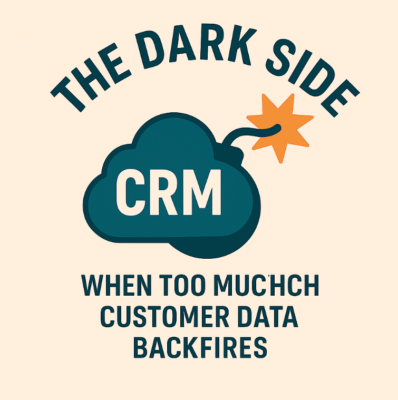
Customer Relationship Management (CRM) is designed to improve customer interactions, personalize experiences, and optimize business strategies. However, excessive data collection and reliance on CRM systems can sometimes have unintended consequences. When businesses collect too much customer data without proper safeguards, it can lead to privacy concerns, trust issues, and operational inefficiencies. Here’s how CRM can backfire when not managed properly.
1. Privacy Concerns and Data Security Risks
One of the biggest risks of excessive data collection is privacy invasion. Customers are becoming increasingly aware of how their data is being used, and any perception of misuse can lead to loss of trust. Data breaches and cyberattacks also pose serious threats, as CRM systems store vast amounts of sensitive customer information. A single security lapse can damage a company’s reputation and result in legal consequences.
2. Over-Personalization Can Feel Invasive
While personalization is a key benefit of CRM, too much of it can be unsettling. Customers may feel uncomfortable when businesses appear to know too much about their habits, preferences, and behaviors. Overly tailored marketing messages or eerily precise recommendations can come across as intrusive rather than helpful, leading to disengagement instead of loyalty.
3. Data Overload and Decision Paralysis
Having an abundance of customer data is not always a good thing. When businesses collect excessive information without a clear strategy for utilizing it, they risk analysis paralysis. Too much data can overwhelm decision-makers, making it harder to extract meaningful insights. Instead of driving innovation, an overloaded CRM system can slow down operations and lead to inefficient resource allocation.
4. Regulatory and Compliance Challenges
With the rise of data protection regulations such as GDPR and CCPA, businesses must be cautious about how they collect, store, and use customer data. Failing to comply with these regulations can result in hefty fines and legal actions. Companies that do not have transparent data policies risk damaging their credibility and facing public backlash.
5. Loss of Human Touch in Customer Relationships
CRM automation helps streamline customer interactions, but excessive reliance on data-driven interactions can make relationships feel robotic. Customers appreciate personalized experiences, but they also value human connection. Over-automating customer engagement may create a disconnect, making interactions feel impersonal and transactional rather than meaningful.
6. Trust Erosion and Customer Backlash
If customers feel their data is being exploited or misused, they may lose trust in a brand. High-profile cases of data misuse have led to widespread customer backlash, forcing companies to rethink their data strategies. Transparency is key—businesses must ensure that customers understand how their data is being used and provide them with control over their personal information.
Conclusion
While CRM systems are powerful tools for improving customer engagement and business operations, excessive reliance on data can have serious drawbacks. Privacy concerns, over-personalization, data overload, compliance risks, and loss of human connection are all potential pitfalls of mismanaged CRM strategies. Businesses must strike a balance between leveraging data for personalization and maintaining customer trust. By prioritizing ethical data practices and ensuring a human touch in customer interactions, companies can maximize the benefits of CRM without falling into its darker pitfalls.